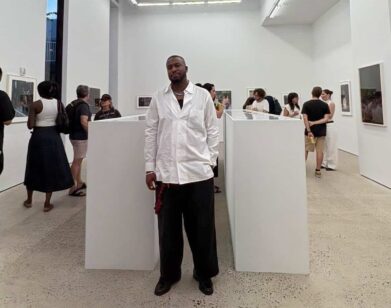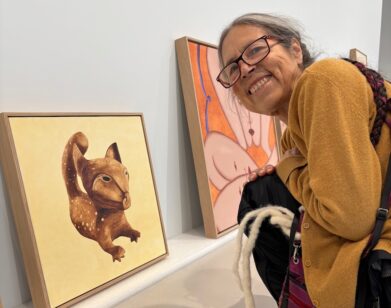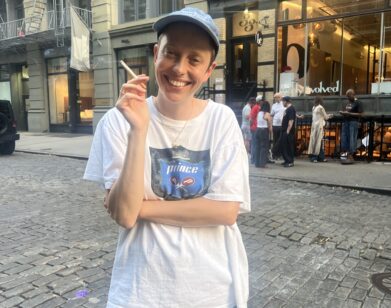Rachel Lee Hovnanian Versus The Future
Taking in Rachel Lee Hovnanian’s installations at Leila Heller Gallery, viewers might feel a bit self-conscious checking their cell phones. Most of the subjects are glued to their own devices, forgoing sex, food, and ignoring giant lab rats as they fiddle with tiny screens. Titled “Plastic Perfect,” the show hones in on how ubiquitous digital technology is changing our expectations, experiences, and particularly our personal relationships. Throughout, classic breakfast cereals are a reoccurring motif—Hovnanian means them to symbolize how sugary cereals were marketed to baby boomer parents as purely, unquestionably beneficial—a parallel to how we embrace exciting new gadgets and apps today.
Scenes in the gallery might be unsettlingly familiar. Foreplay is a video projection on a vertical bed depicting four couples staring glassy-eyed at screens as they are entwined in sheets, ignoring one another. A rotary telephone to the side plays “Isn’t It Romantic” from the handset. In Loco Parentis is a projection of a toddler entranced by an iPad as she sits unattended in a high chair. Cheerios-as-pet bedding form mounds on the floor while game noises blare out. Nearby, an enormous white lab mouse burrows into the refrigerator–a metaphor, Hovnanian explains, for how we’re the acquiescent participants testing arrays of new technology and media.
The most extreme vision in “Plastic Perfect” is Perfect Baby Showroom. Hovnanian envisioned a future where parents, maybe too busy with their phones to even have sex, go to a supermarket to select a genetically enhanced infant. In the installation, hyper-realistic baby dolls rest on bags of Fruit Loops in incubators surrounded by curlicues of wires and walls perforated by outlets. Separate from the large-scale works, Frosted Flakes, Lucky Charms, and Wheaties boxes affixed to wooden boards hang from the walls, cartoon mascots obscured with glittery sludge.
The artist, who speaks with a slight southern accent divulging her Texas upbringing, has been thinking about this for a while. A show in January 2014 at Beijing’s Joyce Gallery featured video projections of a family around a dining room table, fixated on their phones and oblivious as a white mouse devours their food. An earlier version shows a couple at opposite ends of a dining room table, again not speaking as they focus on the screens across their laps, while a white mouse devours a wedding cake.
Though she admits she’s a slave to her own phone, Hovnanian has devised these shows in hopes that her audience might be inspired to take a pause and reflect on their increasingly normalized behavior towards technology. We meet Hovnanian at her studio, where she keeps two well-cared-for white mice, her sometimes-actors, in a cage.
RACHEL SMALL: You mentioned you like doing installations. May I ask why that is?
RACHEL HOVNANIAN: I like to see people have that “a-ha” moment. It makes them start to think. Often with conceptual art you don’t always know what artists are talking about and installations can be a great way to help people understand the work. Also I like to use humor in my work, and sometimes humor is the best way to send a message.
SMALL: [listening to the telephone handset, part of the Foreplay installation] What is this song?
HOVNANIAN: “Isn’t it Romantic,” recorded in 1936. In the song, he says, “I know your profile.” Profile meant something totally different back then. I used the telephone because it was a big change in [the history of] communication—I [as a bystander] don’t know what you’re hearing, and that’s what happens on the telephones.
SMALL: If somebody’s on the phone, I feel like I have to ask, “What’s so funny?” Or if I smile at something and I’m with someone else I feel obligated to tell him or her, “Oh, my friend sent me this funny thing.” It’s a weird curiosity. So, these canvases with glittery boxes of sugary cereal are going to be separate objects in the gallery. Can you explain them?
HOVNANIAN: The idea of the whole show, with the sugary cereals which you see here, is that it parallels the idea that we are told that we need to have these machines. I’m so addicted to my machine I don’t even know that I’m on it. I naturally pick it up. I don’t even notice it. When I was growing up in Texas, my mother wouldn’t let me have sugary cereals. She was like, “Why would you have sugary cereals when it’s so fake?” I said, “Well, it’s so much fun. I want to have it because it’s so cool.” We’re marketed technology in that same way: You have to have this app, the newest and the latest and the greatest, and it’s so much fun to have it all, right?
SMALL: Then you get to tell your friend, “I downloaded this cool, new app,” and you get to use it before everyone else. I feel like it’s impossible to have an extended thought because you’re always getting distracted. It changes your capacity to be able to think through an idea you might have, because automatically it will get cut off.
HOVNANIAN: It’s commonplace that if you’re walking down the street and you’re having a conversation with somebody, if you get a text automatically it’s okay to check or if you’re having dinner it’s okay to check. So, this whole show is [about] taking a pause. Listen, I love my phone, I’m addicted. I’ve said I’d rather lose my wallet than my phone. I’m just investigating: Is this so great? I don’t know. I really love it so much, but then not having that extended thought, not reclining under a tree and looking up and identifying clouds… you know kids are inside on their iPads.
SMALL: They’re so good at it.
HOVNANIAN: They won’t remember what it was like without those things. It’s changing how we are with each other. The couples are together but they can be talking to somebody 10,000 miles away.
SMALL: Was there one particular instance where you noticed, “Oh, that kid knows how to work an iPad better than I do?” Because I know I that I have.
HOVNANIAN: Somebody that I know told me, “Oh, my daughter’s first three words were mama, dada, iPad.”
SMALL: That’s insane.
HOVNANIAN: She’s like, “I don’t know how it happened, but in schools they’re telling them that they don’t need to write anymore. They can just use their iPads.” They’re not teaching cursive anymore. They’re not going to be able to read the Declaration of Independence because it’s in cursive.
SMALL: That’s so bizarre.
HOVNANIAN: [Referencing In Loco Parentis] When I filmed this child, the child didn’t look up for the whole time. She was on the iPad.
SMALL: What about this white mouse in the background?
HOVNANIAN: I actually had white mice when I was growing up, as pets. It was a very rare animal. But through technology we created all these white mice to do testing on. So for me it represents technology itself. Even if you think you can get away from technology, you can’t. That technology, I mean it’s here, it’s only going to get more and more [prevalent]. I feel like we’re the new lab rats and they’re doing all this research on us now. Facebook did research without us knowing about it, you know? We’re being studied. The lab mouse has total freedom; that’s why it’s eating out of the refrigerator. It’s like the white elephant in the room–it’s so big and we’re not even aware it’s there because we naturally accept it.
[Moving on to Perfect Baby Showroom]
SMALL: I feel like there have been hints of this in science fiction. Have your perfect child, perfect human beings. Can I ask how this work came together for you?
HOVNANIAN: I know that you can do this. They’re researching to find the quantitative gene in people because that could be beneficial. Then we can rig the children so that they can have it. There are so many great things about this, because you can get rid of so many diseases. But when you start to play around with genetic modification it is a little bit scary and then… why wouldn’t we want to have the perfect children? So the work is like a showroom for cars or the latest iPhone.
SMALL: What if the next generation of children was upgraded? The ones who missed out just slightly wouldn’t be able to keep up.
HOVNANIAN: Maybe eventually because we are on our technology all the time we will not need to have sex—we could just order the baby while we’re in bed. There’s a loss of intimacy. What’s the most intimate thing? Having a baby. Something that can be so fabulous, but there’s always the repercussions. When Wheaties were sold to us they said, “Oh, if you eat this then you’ll be this famous star.” I really did think that because the media taught us that. If you look at the commercials, it’s crazy. They would sell us Wheaties because they’d say, “You can be a better athlete, and get your parents to buy it.” Then the cartoon characters make it fun and exciting. They’re telling us that it’s fast, it’s easy, and it’s good for you. Now we’re finding out that, it is fast, it is easy, but maybe it’s not so good for you. That’s what I’m playing with, that idea. I’m just pausing to say, “Wait a minute, is this so good?” I’m not being intimate with the people next to me because I’m on my phone and I don’t even know I’m doing it. It’s crazy.
SMALL: You totally tune out. I feel like I have to be conscious when I’m with someone, if there’s a moment of silence, maybe an awkward moment–I have to consciously resist checking my phone. Of course, if the other person goes to the bathroom I’ll immediately go to my phone.
HOVNANIAN: Yeah. It used to be that if I were on a bus, for instance, I would chat to the person next to me. But now I’m on a bus, if I don’t know the person, I won’t extend myself. Because people feel awkward, so you feel awkward.
SMALL: But no one’s going to go and throw away his or her phone at the end of the day.
HOVNANIAN: It’s here to stay. I just want to pause and say we need to unplug, to have those extended thoughts, like you said. [In the show] I’m looking at how we relate to digital technology and how it makes us relate to each other. Taking pause, to notice. Because this baby [in In Loco Parentis] won’t know what it was like without it.
SMALL: She’s going through life probably not knowing what boredom feels like. She’s never going to have to try to invent something to get out of that boredom because there’s always going to be something there. So who knows what’s lost. There doesn’t seem to be a loss, but if there’s an absence of stuff to do, who knows what could have come out of that?
HOVNANIAN: That is a great insight, the boredom.
SMALL: Boredom can be important—because it forces you to have an imagination.
HOVNANIAN: I used to fall asleep when my mother would make lunch. I was a big daydreamer and I would fall asleep daydreaming. I mean, you’re right, it’s not allowing people to daydream…
SMALL: The younger generation has a reputation for being particularly narcissistic, and it is blamed on largely on social media, accessible constantly through technology. Would you say technology fuels narcissism?
HOVNANIAN: I think definitely. I’m reading Sherry Turkle’s book Alone Together. Ten years ago she was in Wired magazine saying that the Internet is just the most fantastic thing: It’s going to bring us closer together; it’s going to do so many wonderful things. She said “I still believe that,” but she said, “Now I’m nervous because we’ve almost gone too far into it.” We’re more anxious; we’re more alone; we prefer to go to our computer than to each other because it’s so much easier. I was talking to a friend the other day and she said “Oh my gosh, I got a text from a guy but I couldn’t tell if he was asking me out.” It was all through text messaging. I mean, I prefer to use text messaging. Everybody does. But she said, “I couldn’t tell if he was asking me out,” so it was not going anywhere; there’s less commitment to it. Turkle talks about the computer, that everything we have on the computer is all geared to ourselves. So whatever apps we want, Instagram, Twitter–all of that, is geared to us–so it’s a natural thing; it’s our reflection in the computer.
“PLASTIC PERFECT” WILL BE ON VIEW AT LEILA HELLER GALLERY FROM SEPTEMBER 4 TO OCTOBER 18, 2014.







